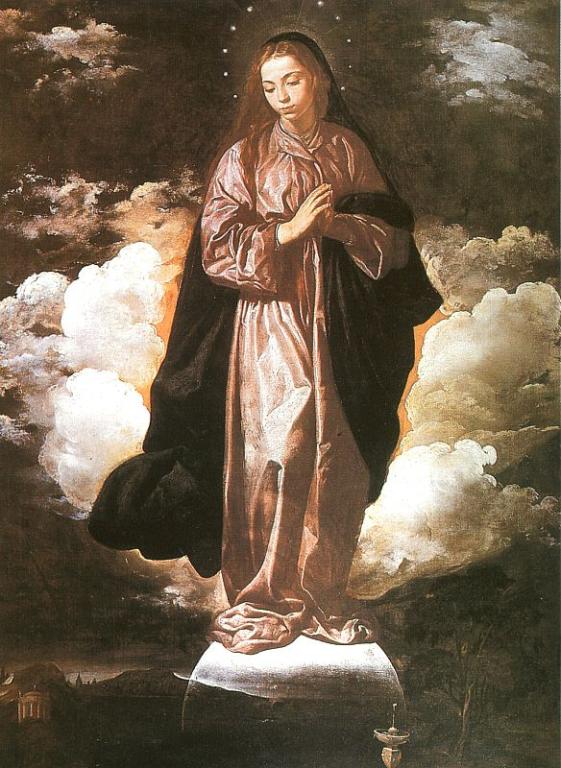. . . from Analogy and Plausibility
Immaculate Conception (c. 1618), by Diego Velázquez (1599–1660) [public domain / Wikimedia Commons]
From my book, “The Catholic Mary”: Quite Contrary to the Bible?
* * * * *
Neither the notion nor the fact of a sinless created being is impossible. The angels (excepting the fallen ones, or demons) are sinless and always have been. They never sinned. They never rebelled against God. They’re creatures as we are, with a free will to sin or not sin. Adam and Eve were originally sinless and could have remained so had they not rebelled against God’s commands.
Babies in the womb are without actual sin (though not without original sin), and even after birth they cannot sin mortally (with full subjective awareness necessary for mortal sin) for quite some time, until they attain the age of reason.
The Immaculate Conception was not, strictly speaking, absolutely necessary for God to do. God could possibly have gone about things a different way, just as He could have saved mankind with just His word, without a bloody cross and Jesus’ agonizing suffering, had He chosen to do that.
That is freely granted in Catholic (as well as in most non-Catholic Christian) theology. That said, we contend that the Immaculate Conception is a completely plausible act of God, and most fitting and proper and should not be at all “surprising,” in light of several analogous variables in Scripture.
Another biblical argument can be made from the “proximity to God”: in other words, “the closer one gets to God, the more holy one must be.” I developed this at some length in my first book, A Biblical Defense of Catholicism (pp. 178-185). The presence of God imparts holiness (Deuteronomy 7:6; 26:19; Jeremiah 2:3). The temple site was sacred and holy (Isaiah 11:9; 56:7; 64:10), and the Holy of Holies where God was specially present above the ark of the covenant (Exodus 25:22), was the holiest place of all within the temple. When we are ultimately with God in heaven, sin is abolished once and for all (1 John 3:3-9; Revelation 14:5; 21:27).
In order to be such a magnificent vessel for the Incarnate God Himself, it stands to reason that God would make the Blessed Virgin Mary an exceptional human being: not only full of grace and therefore sinless (Luke 1:28), but ordained as completely free from original sin, from the moment of her conception: to be preserved by a special act of grace from God, from all sin whatever: original and actual.
Now, the challenge at this point is to show how and why one would posit the Immaculate Conception, based on the biblical data alone (since our Protestant brethren put the highest emphasis on Scripture, and regard it as the only infallible authority in Christianity). Is it possible to do that? Can some semblance of an argument be made from the Bible: if not directly (as we grant), at least from analogy, plausibility, and indirect deduction? I think so.
A sinless Mary is a completely biblical concept: even a fairly explicit one: once one examines Luke 1:28 very closely (the meaning of the Greek word involved: kecharitomene) and realizes the inexorable deductions based on the nature of grace and its relation to sin (about which the Bible has much to say). I made this argument in my book, The Catholic Verses (pp. 181-190), and consider it a rather strong one. In a nutshell, the reasoning works as follows:
1) Grace saves us.
2) Grace is the antithesis of sin and gives us the power to be holy and righteous and without sin.
3) To be full of the grace (Luke 1:28) which gives us the power to be holy and righteous and without sin, is to be fully without sin, by that same grace.
Now we must make some connection between Mary’s conception or (failing that) at least sanctity from the womb, to provide some biblical rationale for her Immaculate Conception. The Bible doesn’t directly reveal anything in this respect about Mary. It informs us (through the mouth of the angel Gabriel) that she is “full of grace” and that this state was present at the time of the Annunciation.
From that information alone, however, we can’t tell how long Mary had been full of grace and without sin. Therefore, that particular aspect has to be argued from analogy and plausibility. And I think that can be done as well.
It’s fairly easy to find examples of holy people who have been sanctified or made righteous from the womb, and even (in terms of God’s foreordination or predestination) from before they were ever conceived. The Bible does refer to holiness being imparted even before birth; indeed, even before conception.
Before we pursue that line of thought, let’s step back a bit and note that the biblical writers are fully aware of the notion of conception itself. And this presupposes that a person (with a soul; otherwise he or she is no person) is in existence from that time (e.g., Genesis 25:21; Numbers 5:28; 2 Samuel 11:5; Job 3:3; Psalm 51:5; Song of Solomon 8:2; Luke 2:21; Romans 9:10).
Does the Bible, moreover, refer to people being called from the womb for His purposes? Yes; Samson was one such person:
Judges 16:17 (RSV) And he told her all his mind, and said to her, “A razor has never come upon my head; for I have been a Nazirite to God from my mother’s womb. If I be shaved, then my strength will leave me, and I shall become weak, and be like any other man.”
A Nazirite was a person who separated himself and was specially consecrated to God: one who made special vows that went beyond the ordinary requirements of the Law. But we know that Samson was not without sin, so his example suffices only to show that being called by God before birth is not unknown in Holy Scripture. The same notion occurs in relation to Isaiah the prophet:
Isaiah 49:1, 5 . . . The LORD called me from the womb, . . . [5] And now the LORD says, who formed me from the womb to be his servant, to bring Jacob back to him, and that Israel might be gathered to him, for I am honored in the eyes of the LORD, and my God has become my strength –
We find the same in the book of Job:
Job 31:15, 18 Did not he who made me in the womb make him? And did not one fashion us in the womb? . . . (for from his youth I reared him as a father, and from his mother’s womb I guided him);
We also observe in Sacred Scripture that God has plans for His servants from even before they were conceived (God being out of time in the first place):
Psalm 139:13-16 For thou didst form my inward parts, thou didst knit me together in my mother’s womb. [14] I praise thee, for thou art fearful and wonderful. Wonderful are thy works! Thou knowest me right well; [15] my frame was not hidden from thee, when I was being made in secret, intricately wrought in the depths of the earth. [16] Thy eyes beheld my unformed substance; in thy book were written, every one of them, the days that were formed for me, when as yet there was none of them.
Thus, the idea that a person is somehow spiritually formed and molded by God and called from the very time of their conception (and before) is an explicit biblical concept. But we can produce even more than that: having to do also with holiness. The prophet Jeremiah reported the Lord’s revelation to him (as confirmed by another writer of Scripture):
Jeremiah 1:5 “Before I formed you in the womb I knew you, and before you were born I consecrated you; I appointed you a prophet to the nations.” (KJV: “sanctified thee”)
Sirach 49:7 . . . he had been consecrated in the womb as prophet, . . .
“Consecrated” or “sanctified” in Jeremiah 1:5 is the Hebrew word quadash (Strong’s word #6942). According to Gesenius’ Hebrew-Chaldee Lexicon of the Old Testament (Grand Rapids, Michigan: Baker Book House, 1979 reprint, p. 725), in this instance it meant “to declare any one holy.” Gesenius applies this particular meaning also to the temple:
1 Kings 9:3 And the LORD said to him, “I have heard your prayer and your supplication, which you have made before me; I have consecrated this house which you have built, and put my name there for ever; my eyes and my heart will be there for all time.”
Here are a few more related appearances of the word:
Exodus 29:42-43 . . . the door of the tent of meeting before the LORD, where I will meet with you, to speak there to you. [43] There I will meet with the people of Israel, and it shall be sanctified by my glory;
Isaiah 5:16 But the LORD of hosts is exalted in justice, and the Holy God shows himself holy in righteousness.
Ezekiel 20:12 Moreover I gave them my sabbaths, as a sign between me and them, that they might know that I the LORD sanctify them.
Jeremiah was thus consecrated or sanctified from the womb; possibly from conception (the text is somewhat vague as to the exact time). This is fairly analogous to the doctrine of the Immaculate Conception. It approximates it. We know Jeremiah was a very holy man. Was he sinless, though? Perhaps he was. I don’t recall reading accounts of Jeremiah sinning.
We know, after all, that the Bible is very frank about exposing sins where they existed (David’s adultery, Noah’s drunkenness, Moses’ murder, Isaiah’s “unclean lips,” Elijah’s and Jonah’s lapses of faith, Doubting Thomas, Peter’s betrayals, Paul’s persecutions, etc.). Therefore, though the lack of such an account of sin does not prove sinlessness, it is consistent with its possibility.
The retort at this point might be that there is a lack of such a notion in the New Testament. But that’s not true. We have the example of John the Baptist:
Luke 1:15 for he will be great before the Lord, and he shall drink no wine nor strong drink, and he will be filled with the Holy Spirit, even from his mother’s womb.
Luke 1:41, 44 And when Elizabeth heard the greeting of Mary, the babe leaped in her womb; and Elizabeth was filled with the Holy Spirit. . . For behold, when the voice of your greeting came to my ears, the babe in my womb leaped for joy.
We know that John the Baptist was also a very holy man. Was he sinless? We can’t know that for sure from the biblical data. I don’t recall any mention of a sin from John the Baptist, in Scripture. St. Catherine of Siena, for one, believed that he never sinned (A Treatise of Prayer). But we know that he was sanctified from the womb. And that forms some plausible analogy to the Immaculate Conception. Lastly, St. Paul refers to being called before he was born:
Galatians 1:15 . . . he who had set me apart before I was born, and had called me through his grace,
Therefore, by analogy and plausibility, based on many biblical cross-references, we can and may conclude that it is “biblical” and reasonable to believe in faith that Mary was immaculately conceived. Nothing in the Bible contradicts this belief. And there is much that suggests various elements of it, as we have seen. It does require faith, of course, but based on the biblical data alone it is not an unreasonable or “unbiblical” belief at all.
Her sinlessness is taught in Luke 1:28, so we need only extrapolate the sinlessness back into the womb (which is easy to do), and with regard to original sin as well (not as easy, assuredly, but not impossible to imagine, either).
If God calls and predestines people for a specific purpose from all eternity, from before they were ever born, as David states and as Jeremiah strongly implies, then what inherent difficulty is there in His sanctifying a very important person in salvation history, centrally involved in the Incarnation, from conception?
The possibility simply can’t be ruled out. And if God can call Jeremiah and John the Baptist from the womb and (possibly) from conception, why not Mary as well? The one case is no less plausible than the other, and so we believe it, by analogy.
It’s not foreign to biblical thinking, and makes perfect sense. According to the Catholic Church, God restored to Mary the innocence of Eve before the Fall, and filled her with grace, in order to prepare her for her unspeakably sublime, sanctified task as the Mother of God the Son. Why should He not do so?














